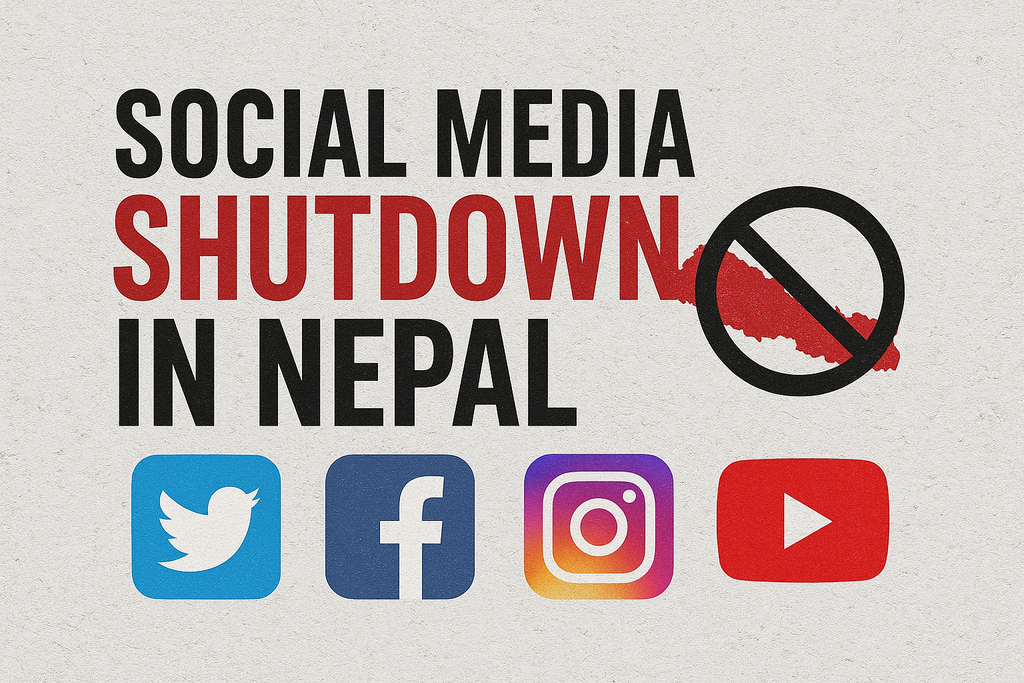Geofinity - Registered Social Media Platforms in Nepal — What You Need to Know ?
In a recent regulatory move, the Government of Nepal has mandated that social media platforms operating within its borders must register officially or risk being blocked.
·
3 min read
What’s Happening in Nepal Now?
Government Ban on Social Media (September 4, 2025)
The Nepali government banned access to 26 major social media and messaging platforms ; including Facebook, Instagram, WhatsApp, X (Twitter), YouTube, LinkedIn, Reddit, and Signal; after they failed to comply with a mandate to register with the Ministry of Communications and Information Technology. Platforms that did comply, like TikTok, Viber, WeTalk, Nimbuzz, and Poppo Live, remain accessible.
1. Current Status: Which Platforms Are Registered and Which Are Blocked?
- As of March–April 2025, only a few platforms have successfully registered. Viber, TikTok, and Saransh Media Lab Pvt. Ltd. (WeTalk) have complied and continue operating.
- Major platforms like Facebook, Instagram, X (formerly Twitter), YouTube, LinkedIn, Snapchat, Telegram, Reddit, and others remain unregistered, despite repeated notices.
- In early September 2025, Nepal officially blocked access to approximately 26 unregistered platforms, including Facebook, Instagram, YouTube, and X. Platforms like TikTok, Viber, WeTalk, Nimbuzz, and Poppo Live remain accessible.
2. ⏱ Timeline: How the Regulatory Push Unfolded
- December 2023: First directive issued under the Electronic Transactions Act, giving platforms three months to register.
- August 2024: Follow-up notices issued.
- March 2025: Final 30-day deadline issued on March 25.
- April–May 2025: Communication with Meta started but remained unresolved.
- August 2025: Supreme Court directive triggers a 7-day compliance deadline
- September 4, 2025: Regulatory block begins for non-compliant platforms.
3. How to Register a Social Media Platform in Nepal
Registration steps, drawn from the draft bill and existing directives:
- Submit Application
- Apply through the Ministry of Communications and Information Technology (MoCIT) or the Department of Information Technology in the prescribed format.
- Provide Required Documentation
- Documents include:
- Company registration certificate
- Memorandum & Articles of Association
- PAN certificate, shareholder information, foreign investment details (if applicable)
- Company records
- Board resolution approving application
- Authorized representative’s ID
- Privacy policy, data security practices, content moderation standards
- Local representative identity proof for foreign entities
- Appoint Required Representatives in Nepal
- A Point of Contact
- A Resident Grievance Handling Officer
- A Compliance Monitoring Officer
- License Renewal & Enforcement
- Platforms must renew permits every few years (e.g., two- or three-year cycles, depending on the final legislation).
- Non-compliance could result in blocking by the Nepal Telecommunications Authority (NTA).
4. Legal Consequences: What Happens if You Don’t Register
- Under the Social Media Directive, failure to register can lead to platform blocking; or permanent shutdown.
- The draft Social Media Bill (2081) includes penalties such as fines and possible imprisonment.
- Platform operators or users spreading fake content could face up to 3 months in jail or fines of INR 50,000; spreading national-impact misinformation could result in 5 years imprisonment or higher fines.
5. Implications and Risks
- For Platforms: Without registration, platforms are inaccessible to Nepali users and risk enforcement action.
- For Users: Access to key platforms like Facebook or YouTube may now be limited; impacting communication, education, and business.
- Civil Liberties: Critics argue this could suppress free speech and promote censorship unless checks are introduced.
Youth Response: “Gen Z Rising”
Protests Organized Across Nepal
Generation Z has spearheaded a significant backlash. Protests are scheduled from September 8, with gatherings planned at Maitighar Mandala and outside the Federal Parliament in Kathmandu, as well as in major cities like Pokhara, Biratnagar, and Dharan.
The movement, known as “The Final Revolution – We Are Punching Up,” frames the social media ban as more than just silencing digital platforms; it’s seen as a broader crackdown on youth agency, expression, and livelihood. Miraj Dhungana, a Gen Z activist, voiced:
Blog Conclusion & Call-to-Action
Bottom line: If you're planning to operate a social media platform in Nepal; from startups to global giants; compliance with the official registration process is no longer optional. The legal framework is now enforced strictly.
Does your platform qualify? Are you aware of renewal cycles, grievance systems, and data policies required under Nepali law?
TG

No comments yet. Login to start a new discussion Start a new discussion